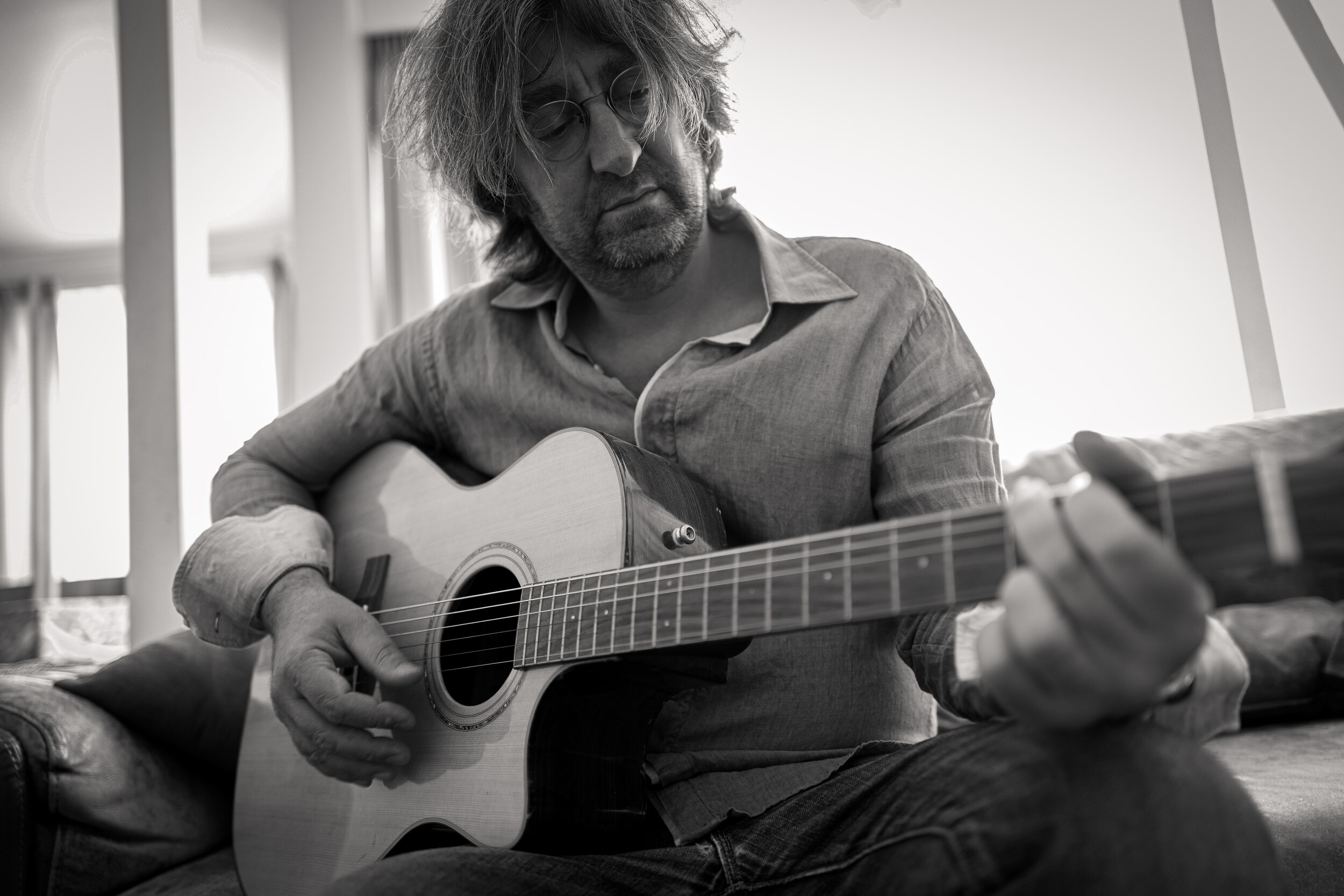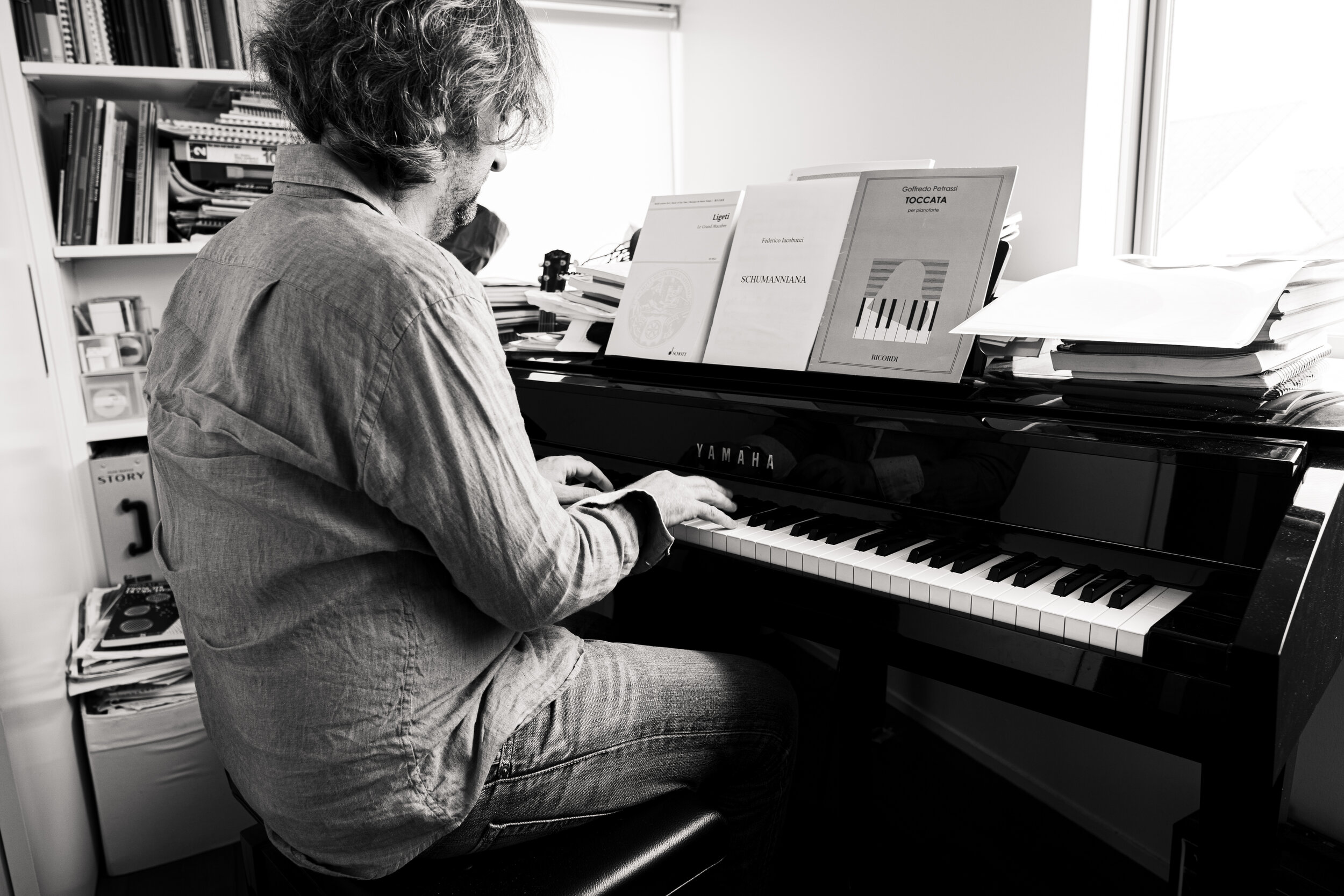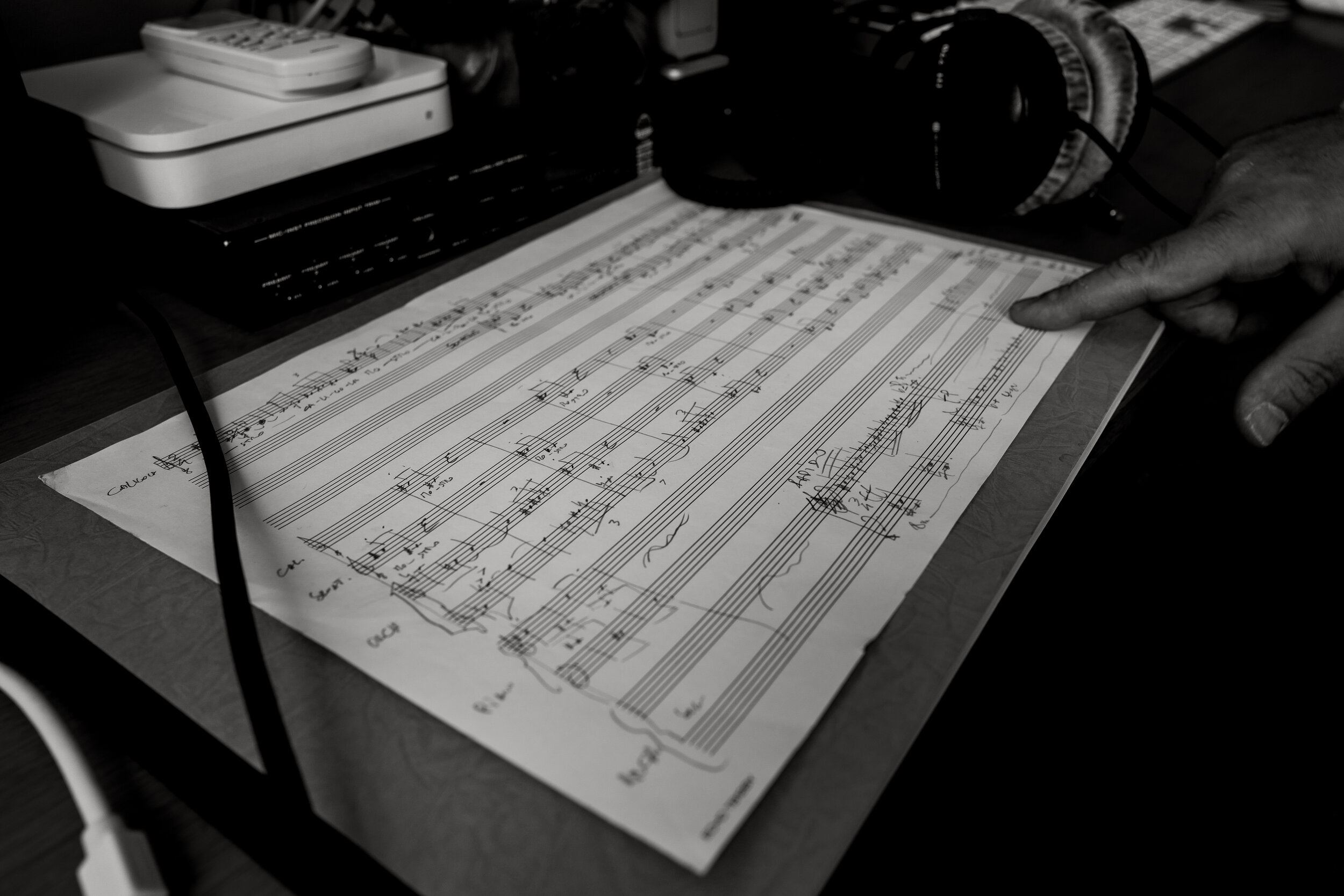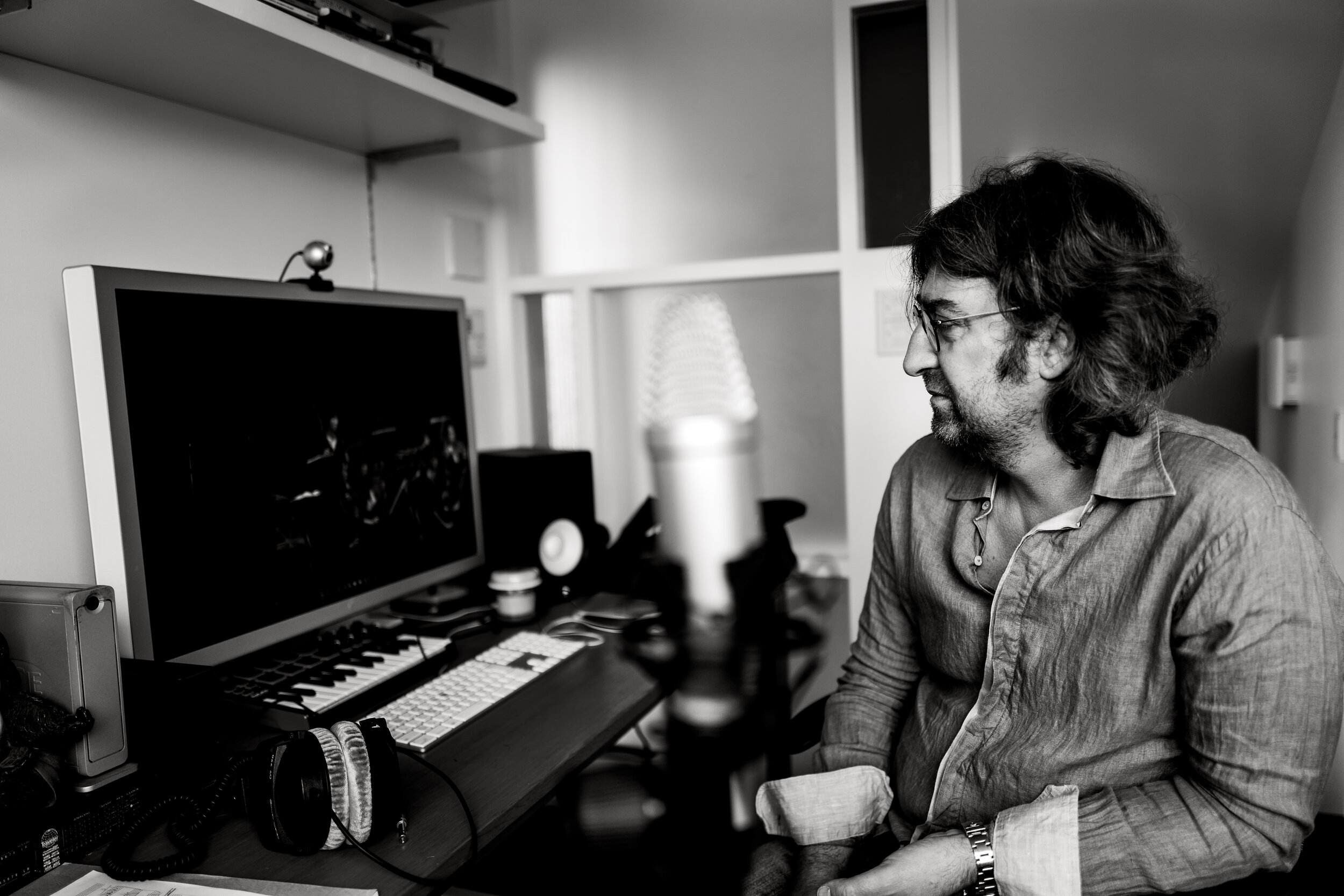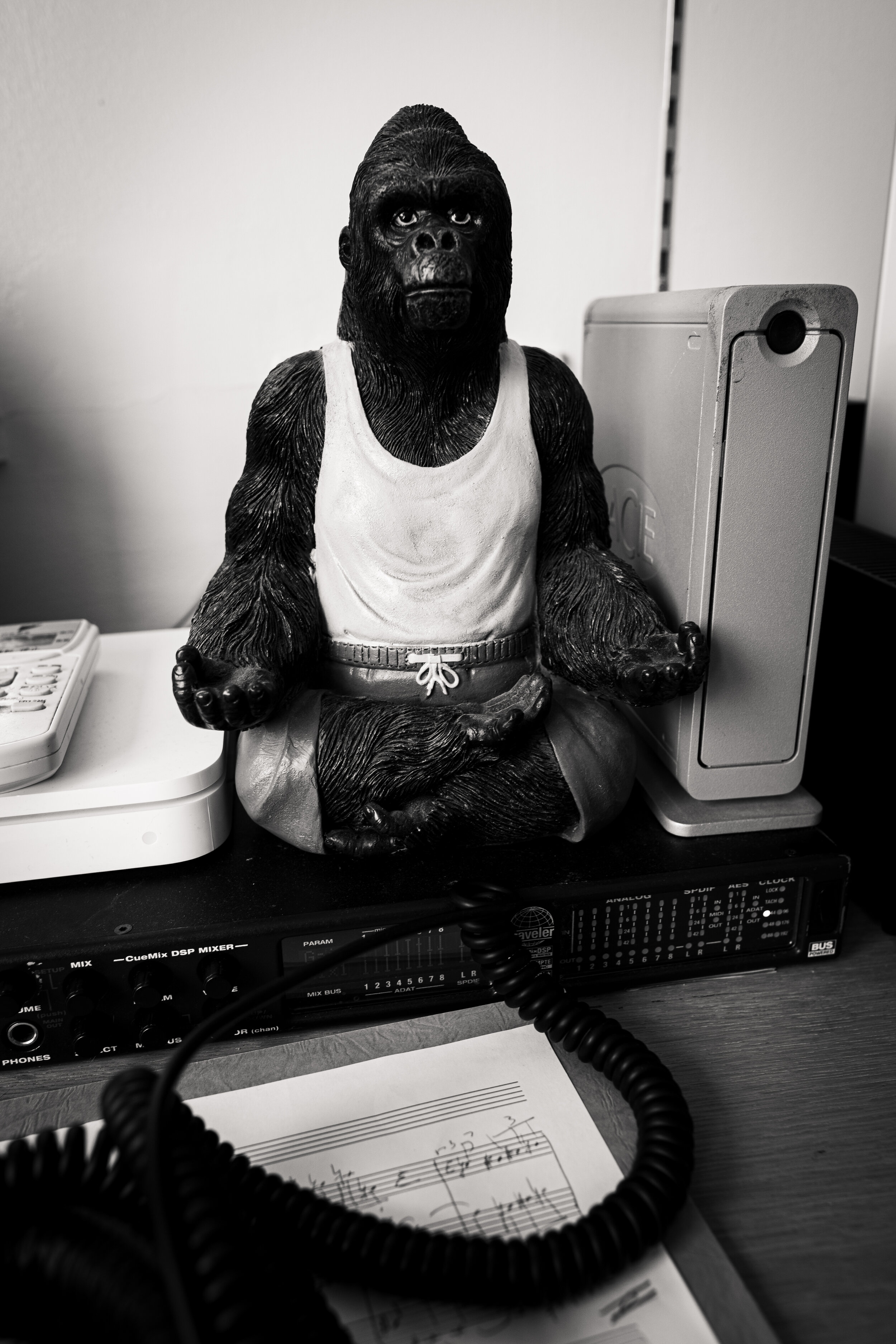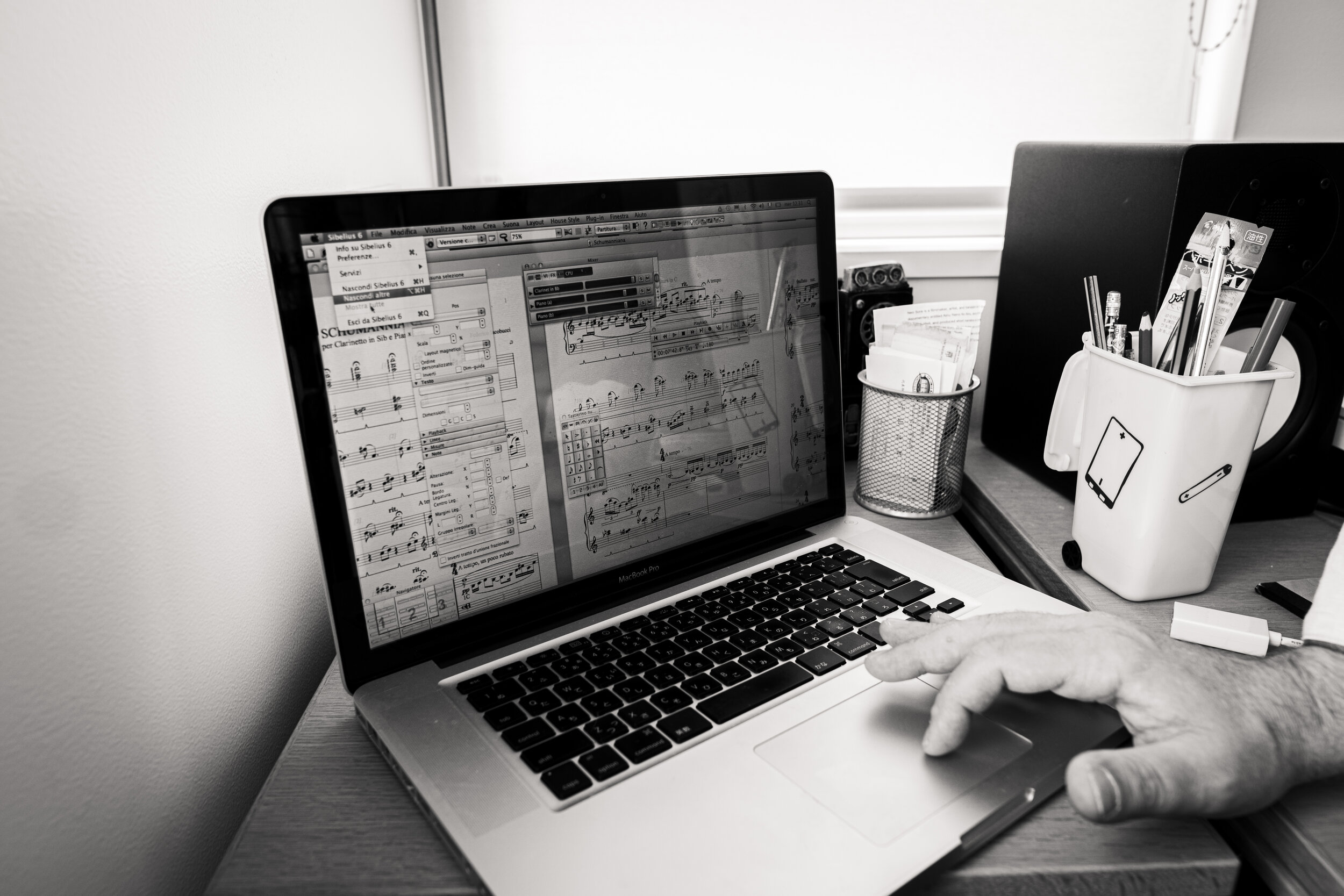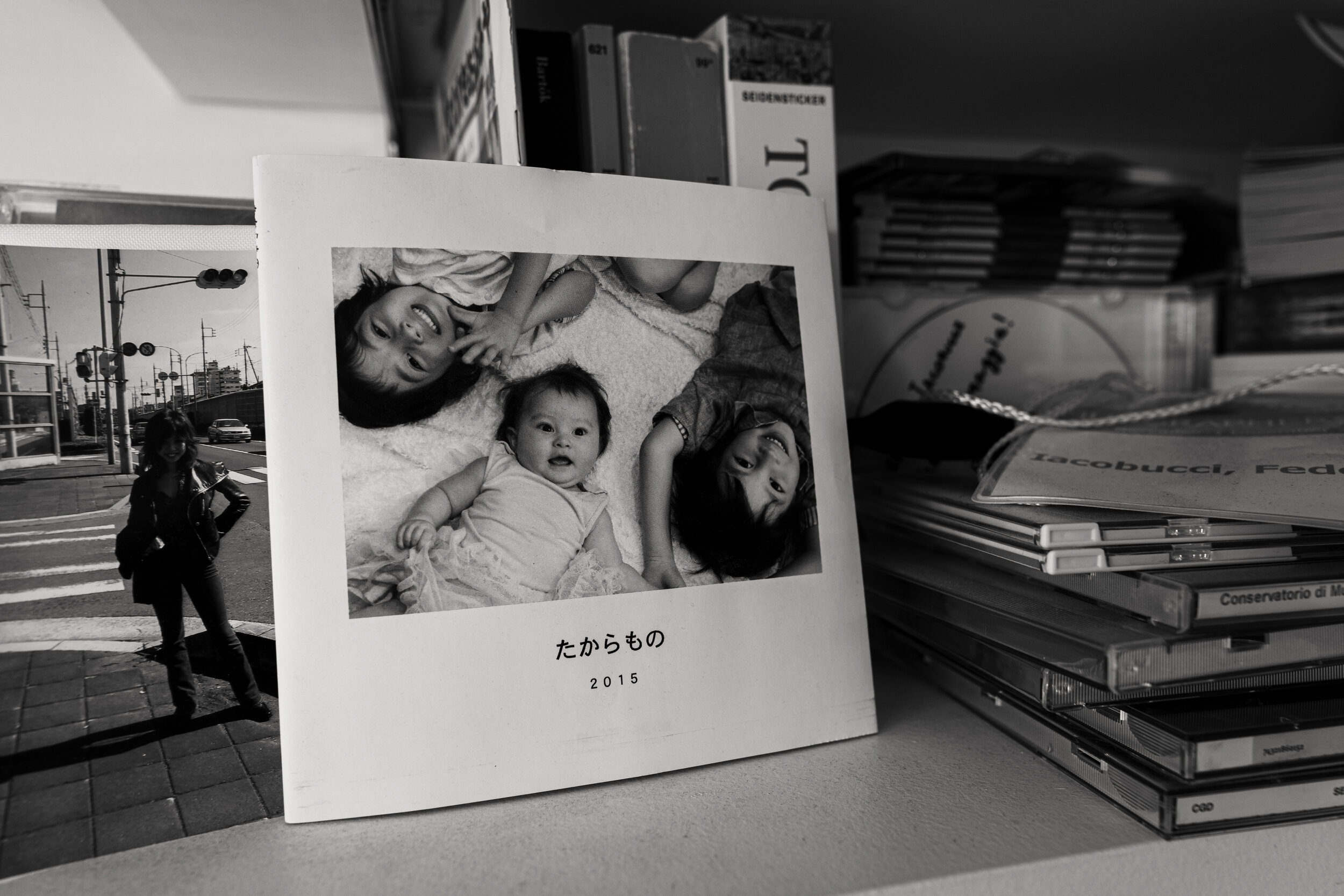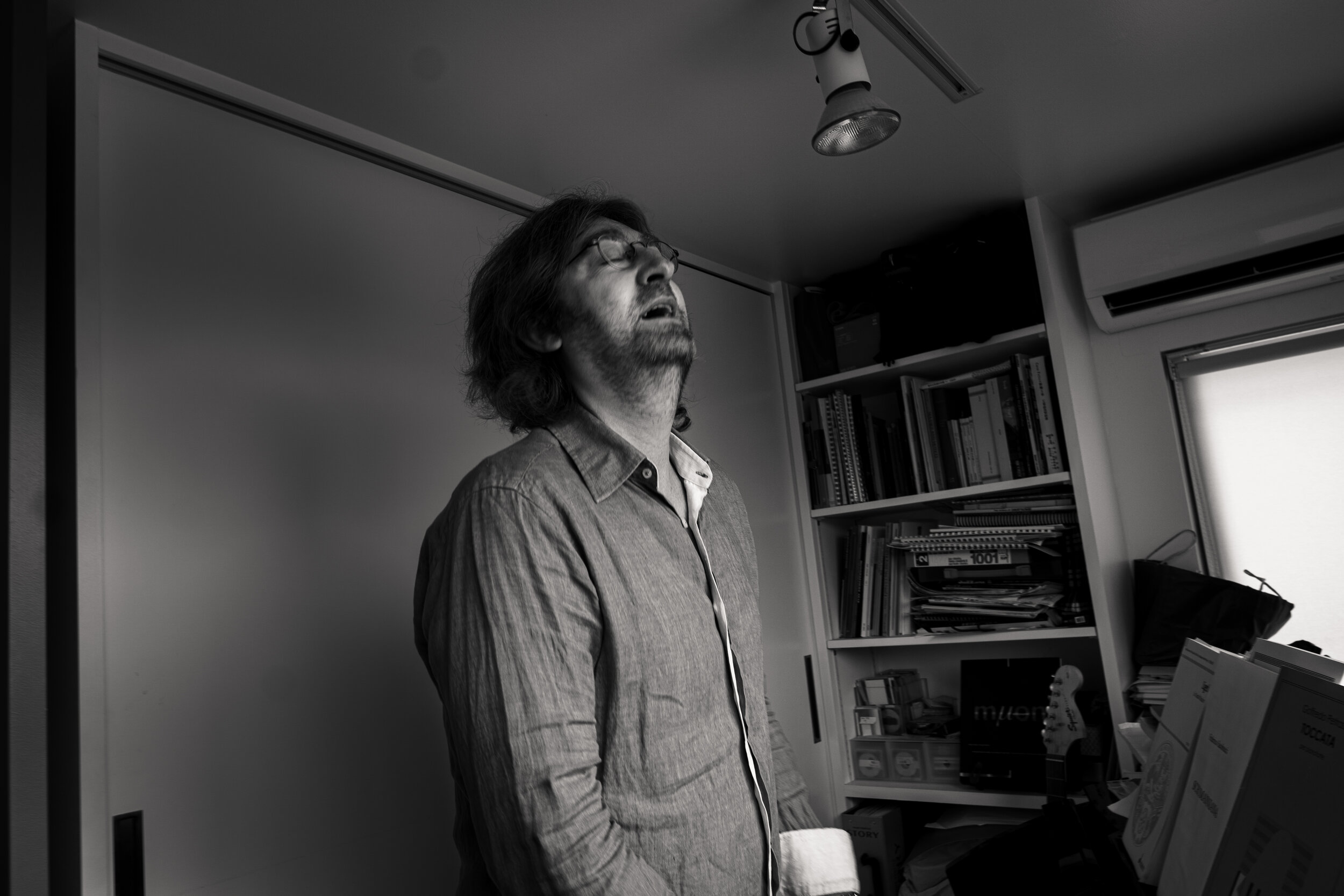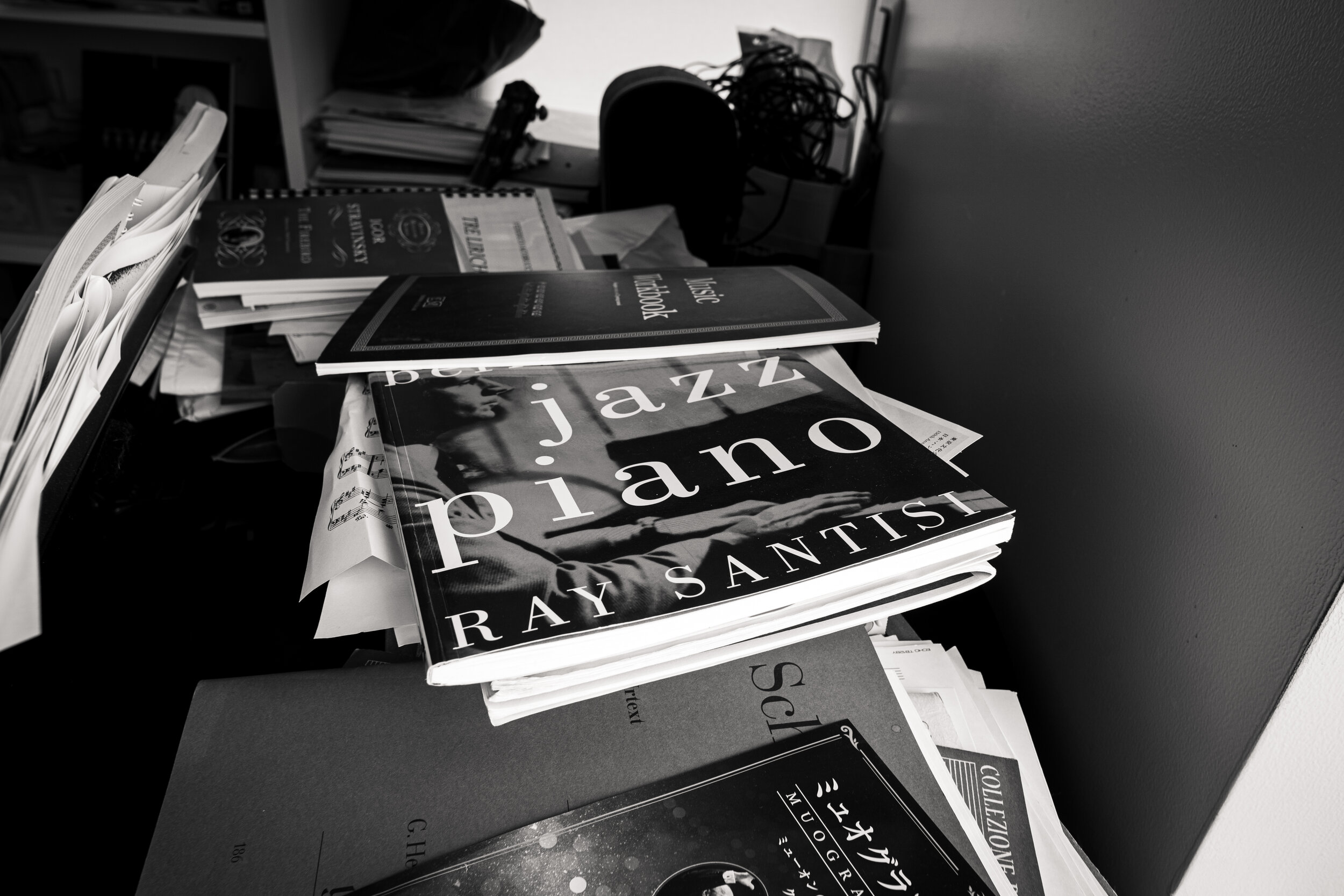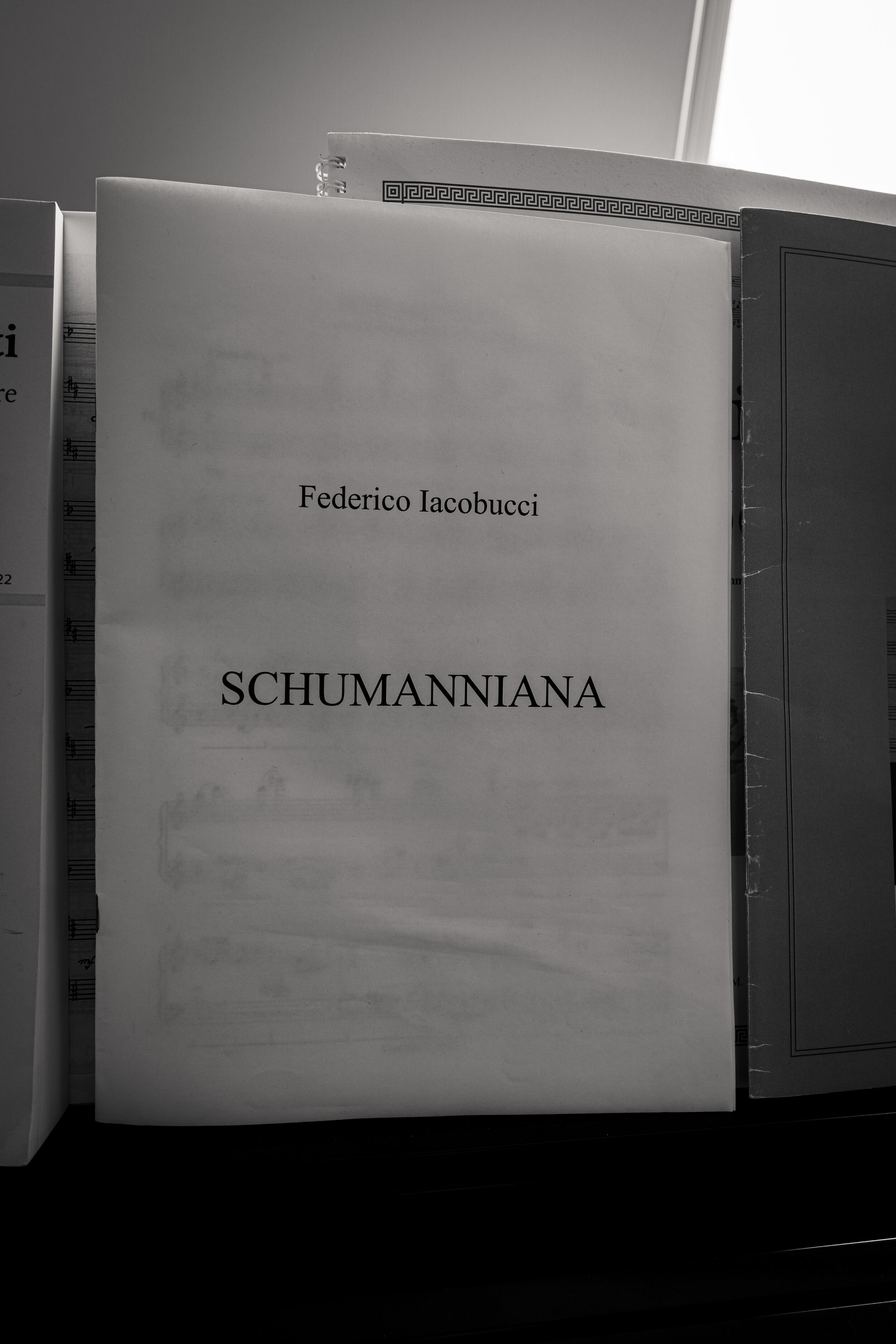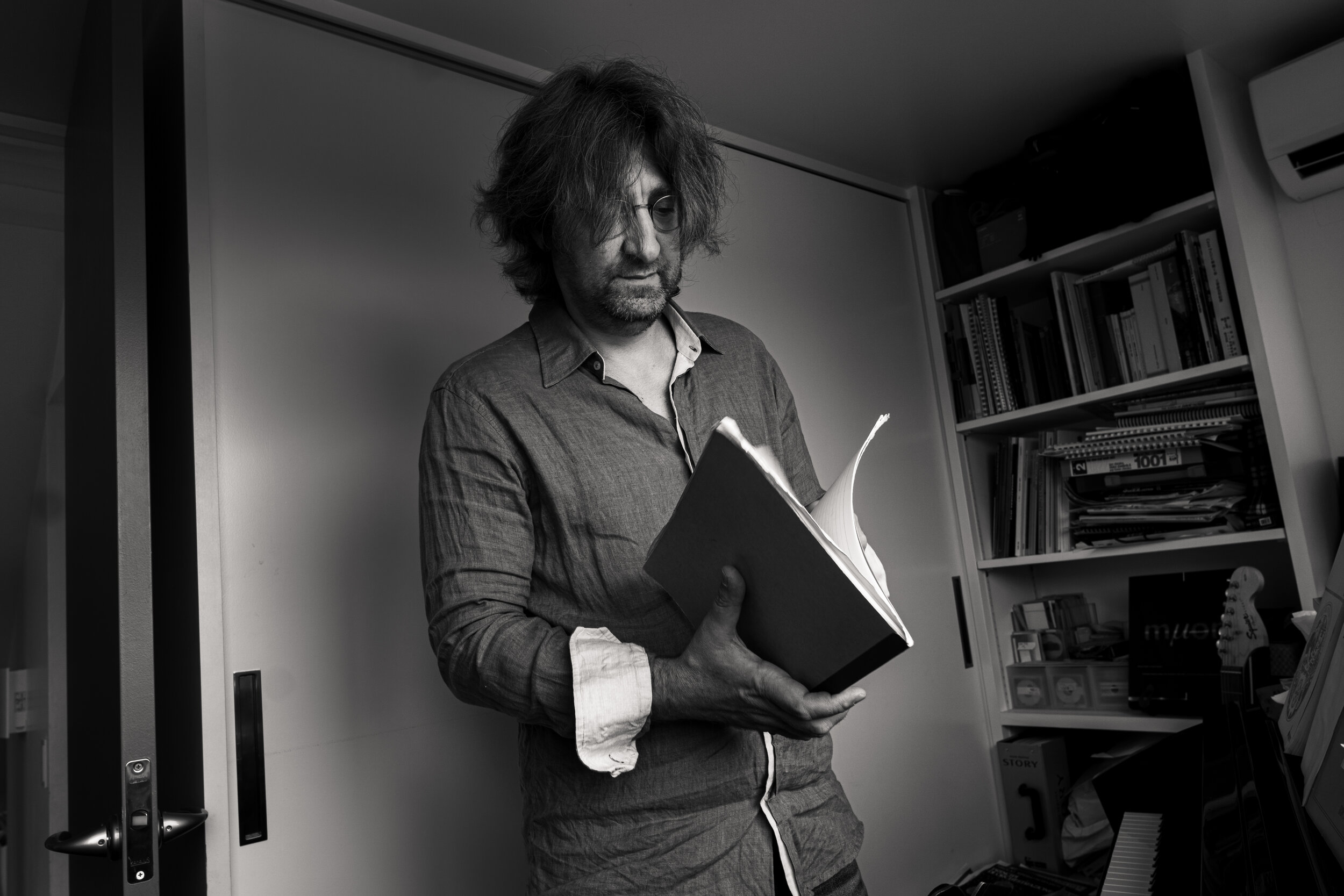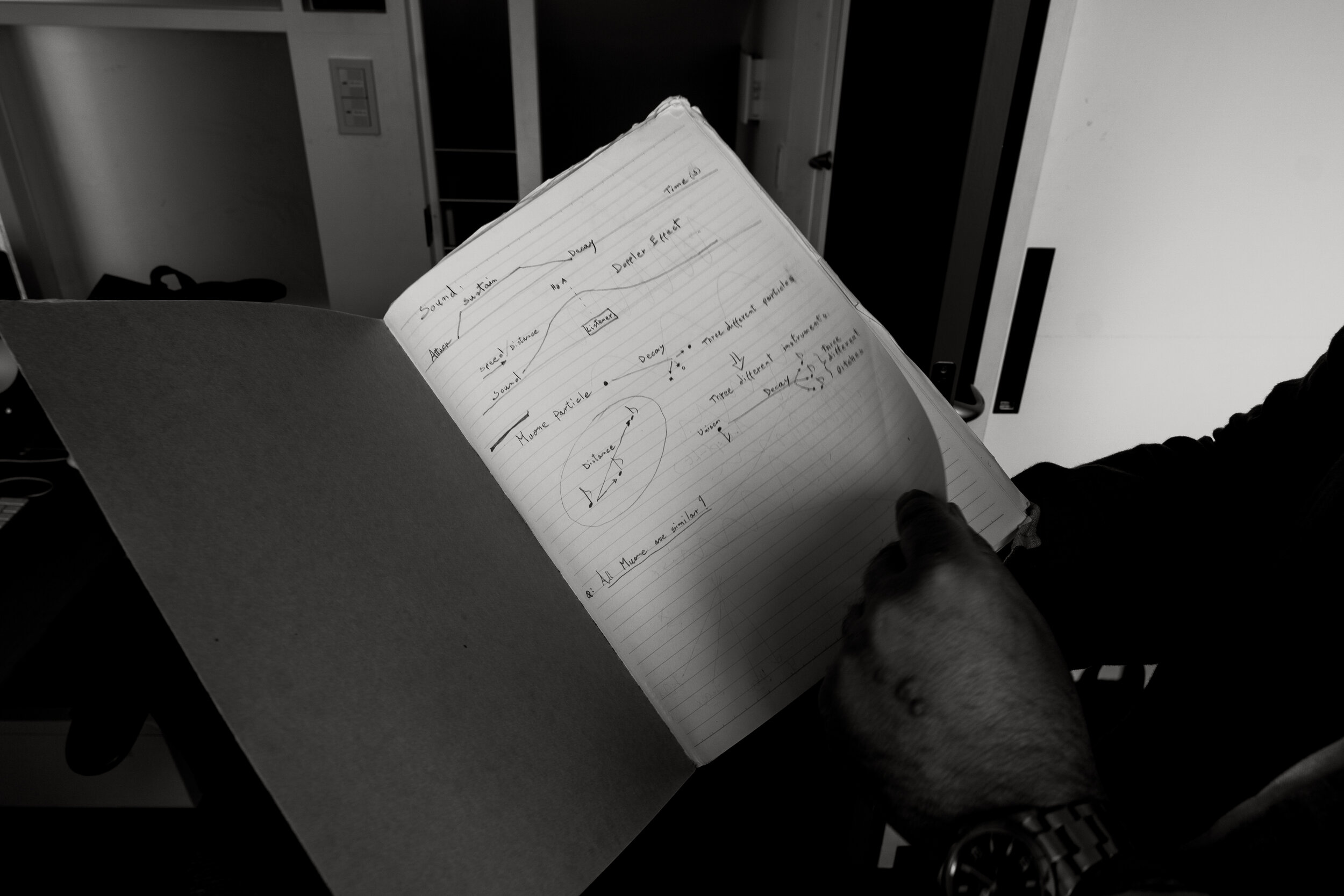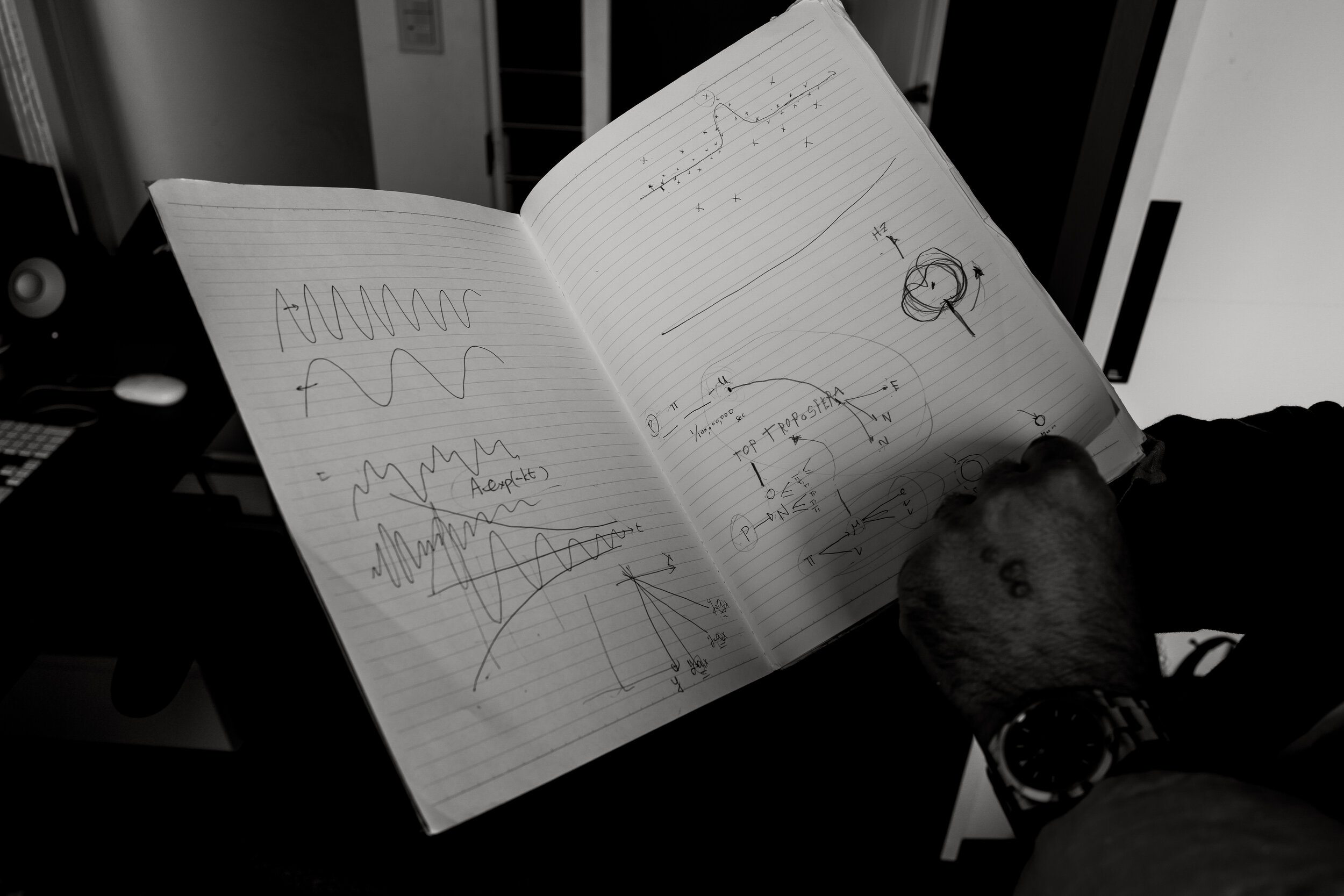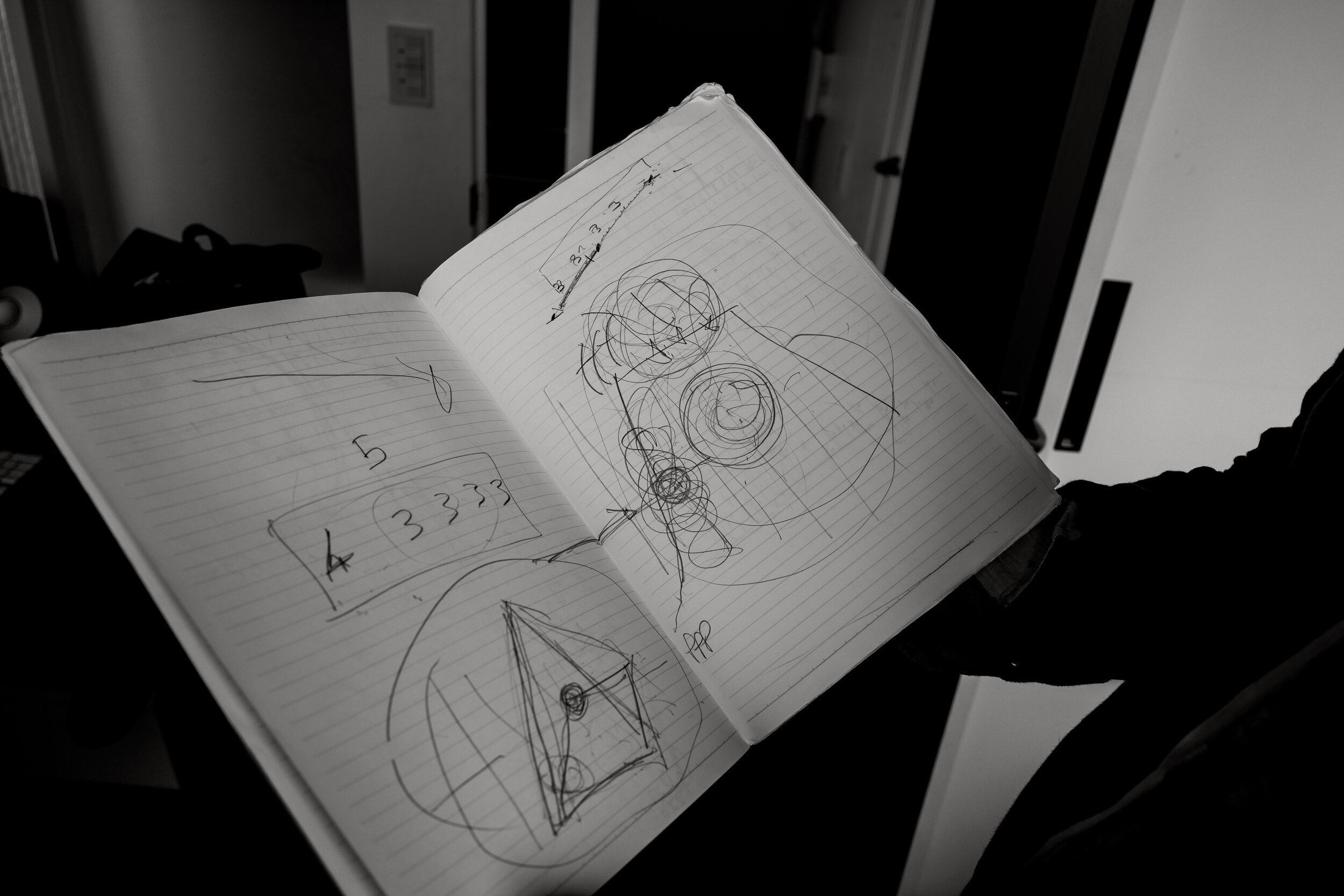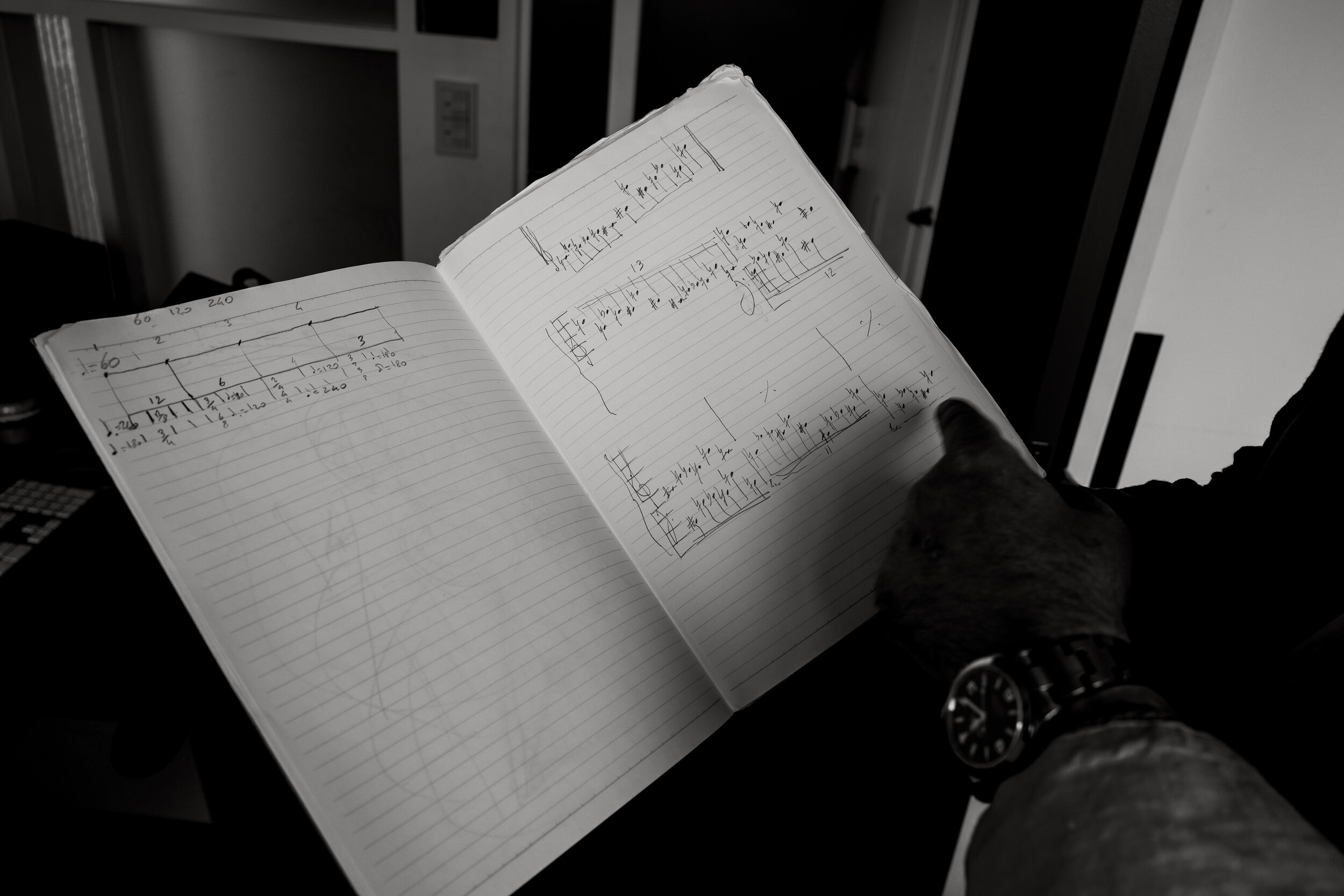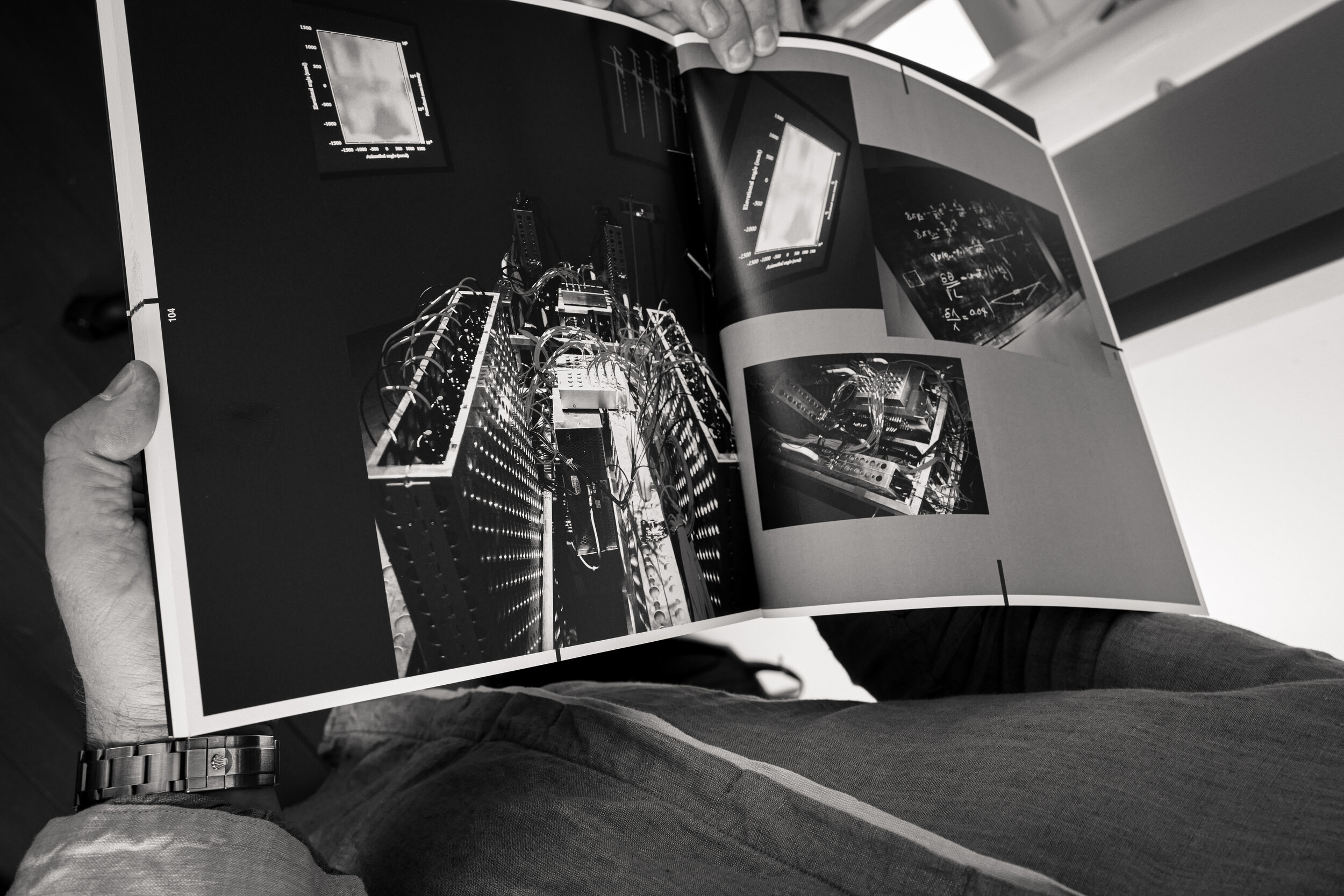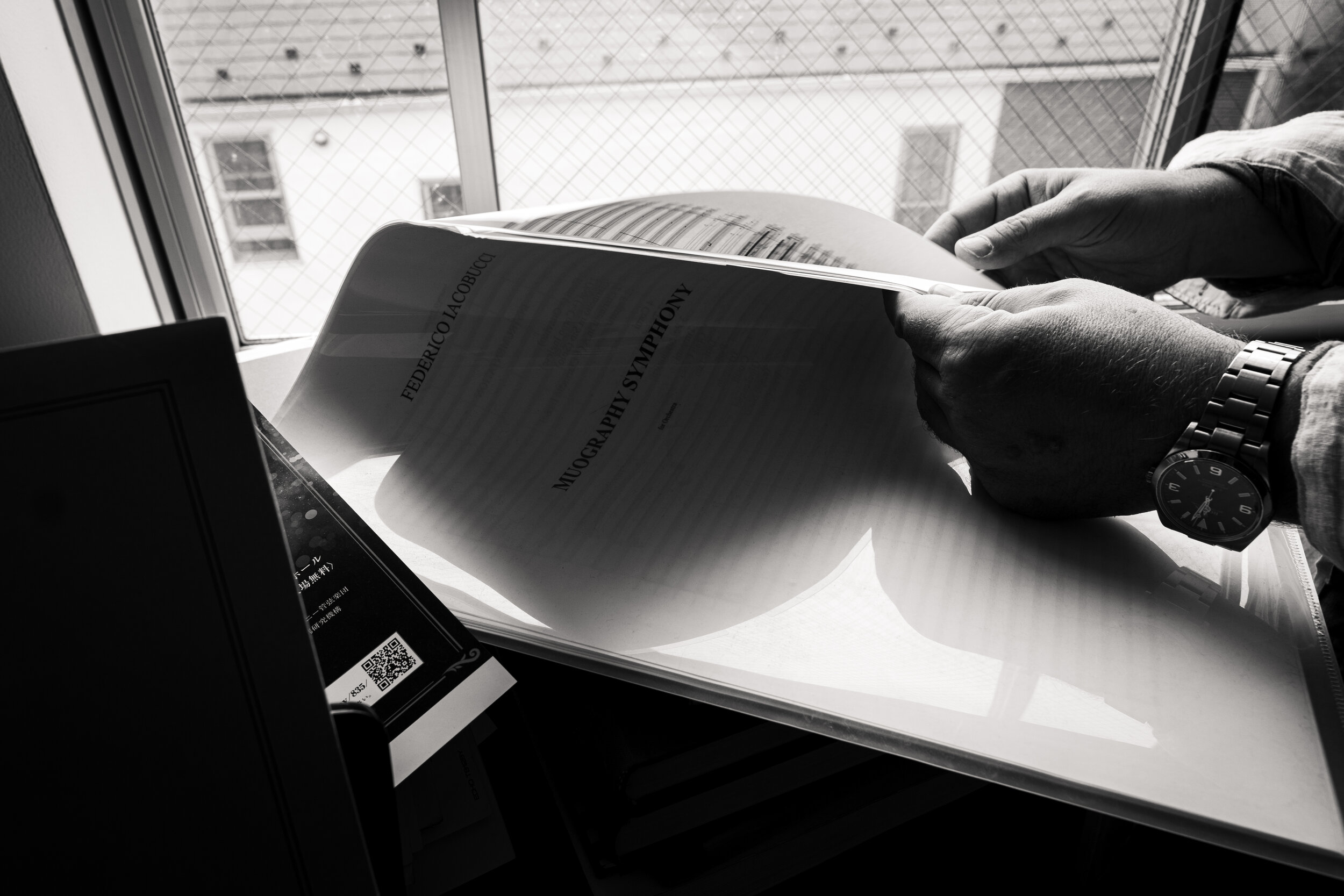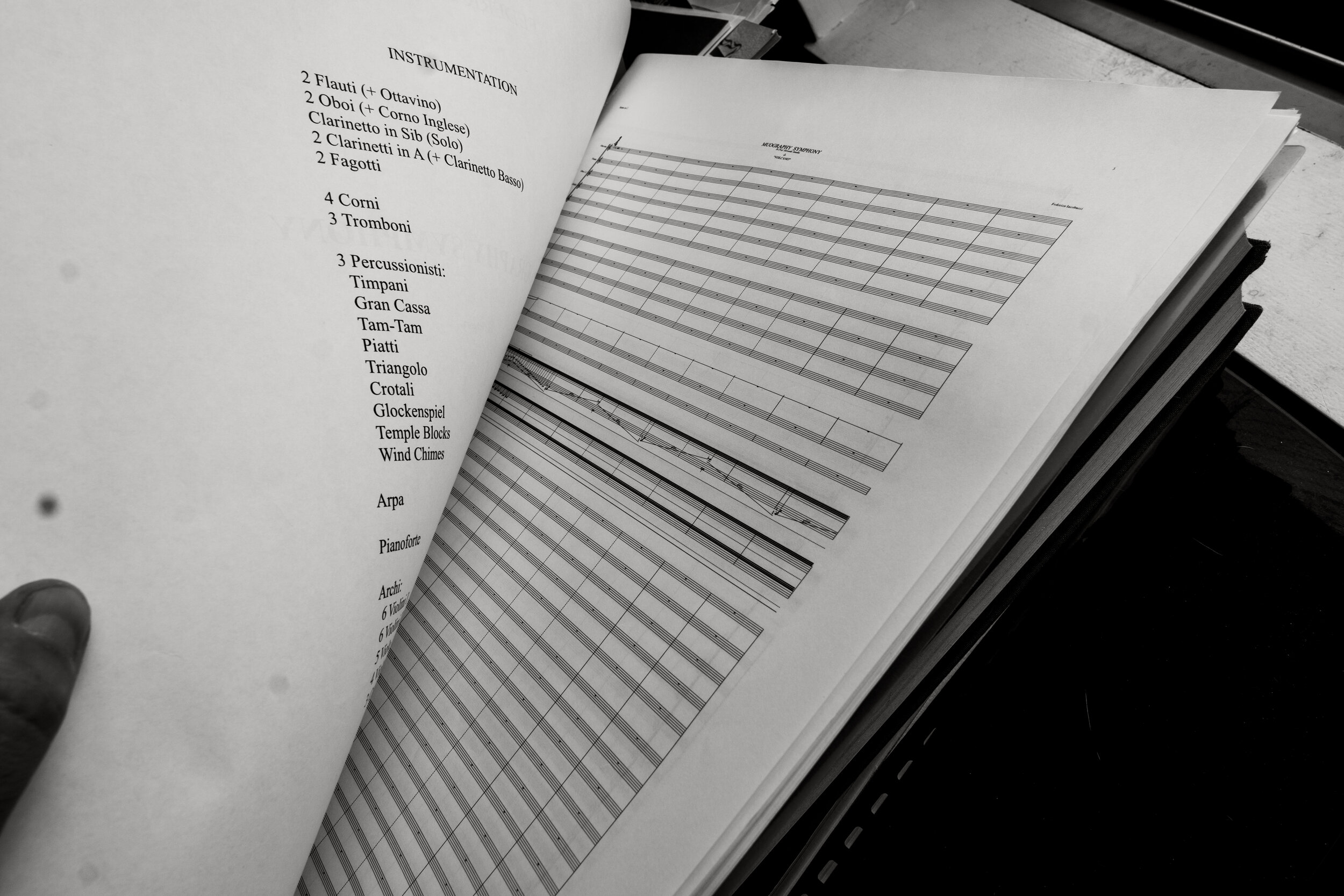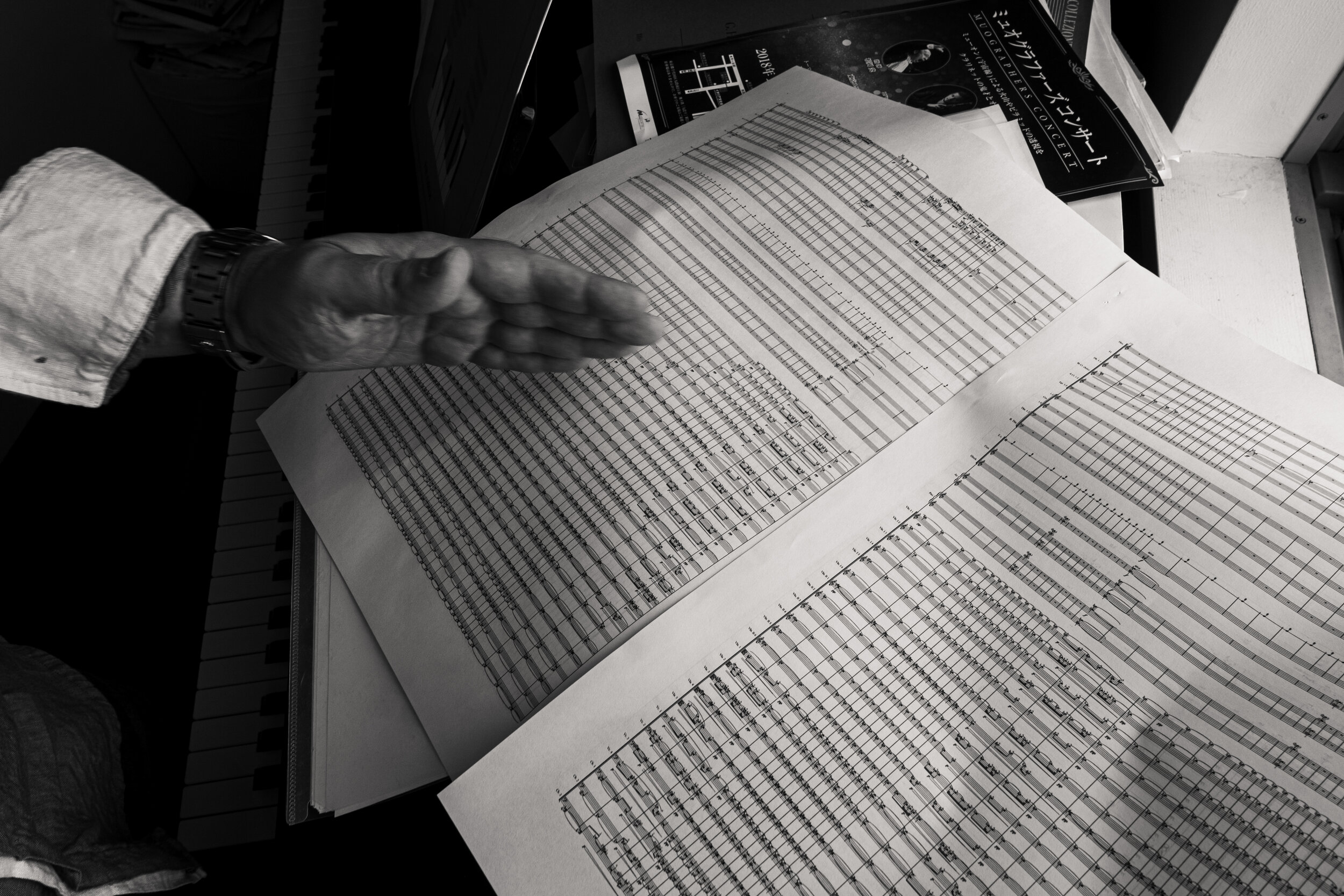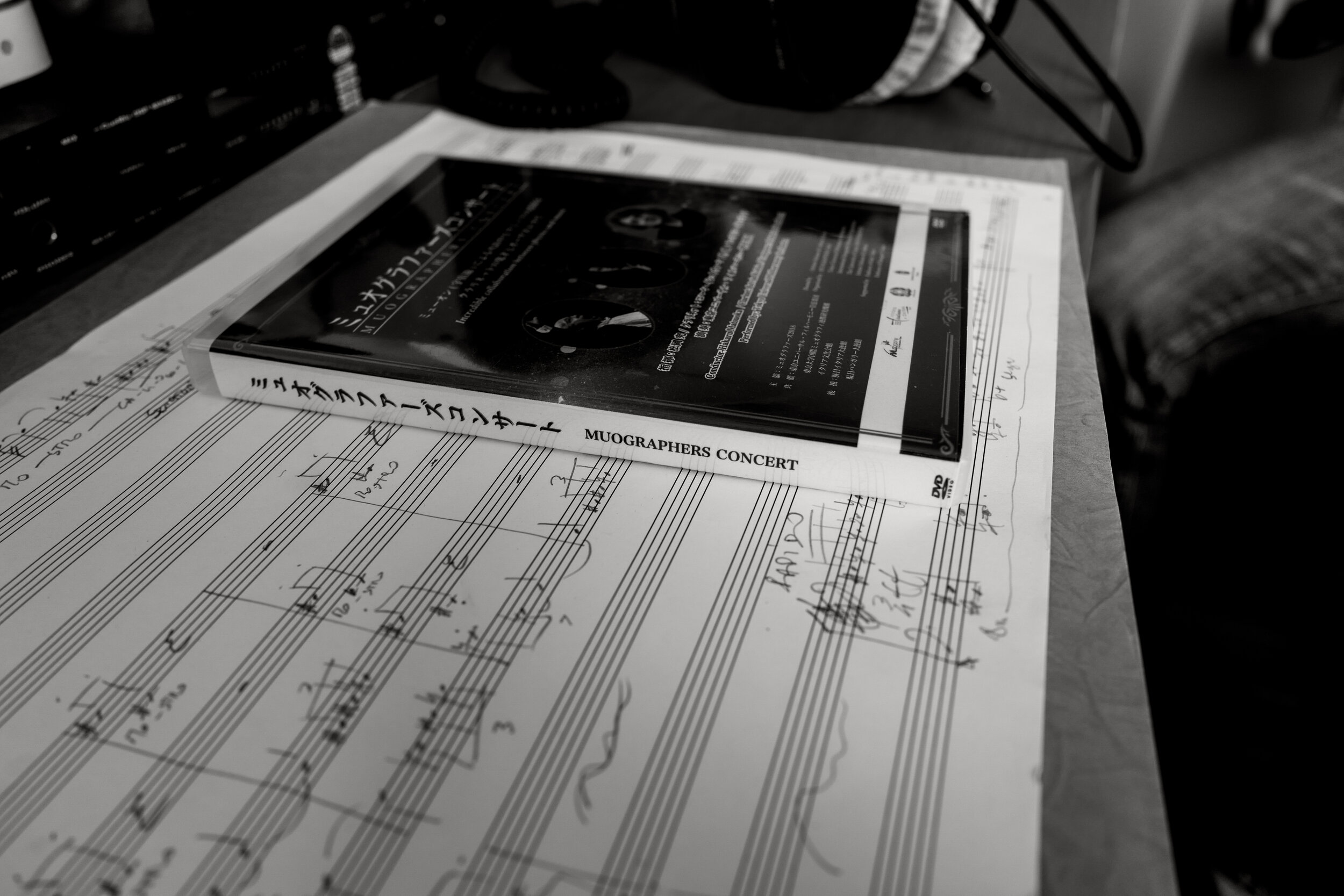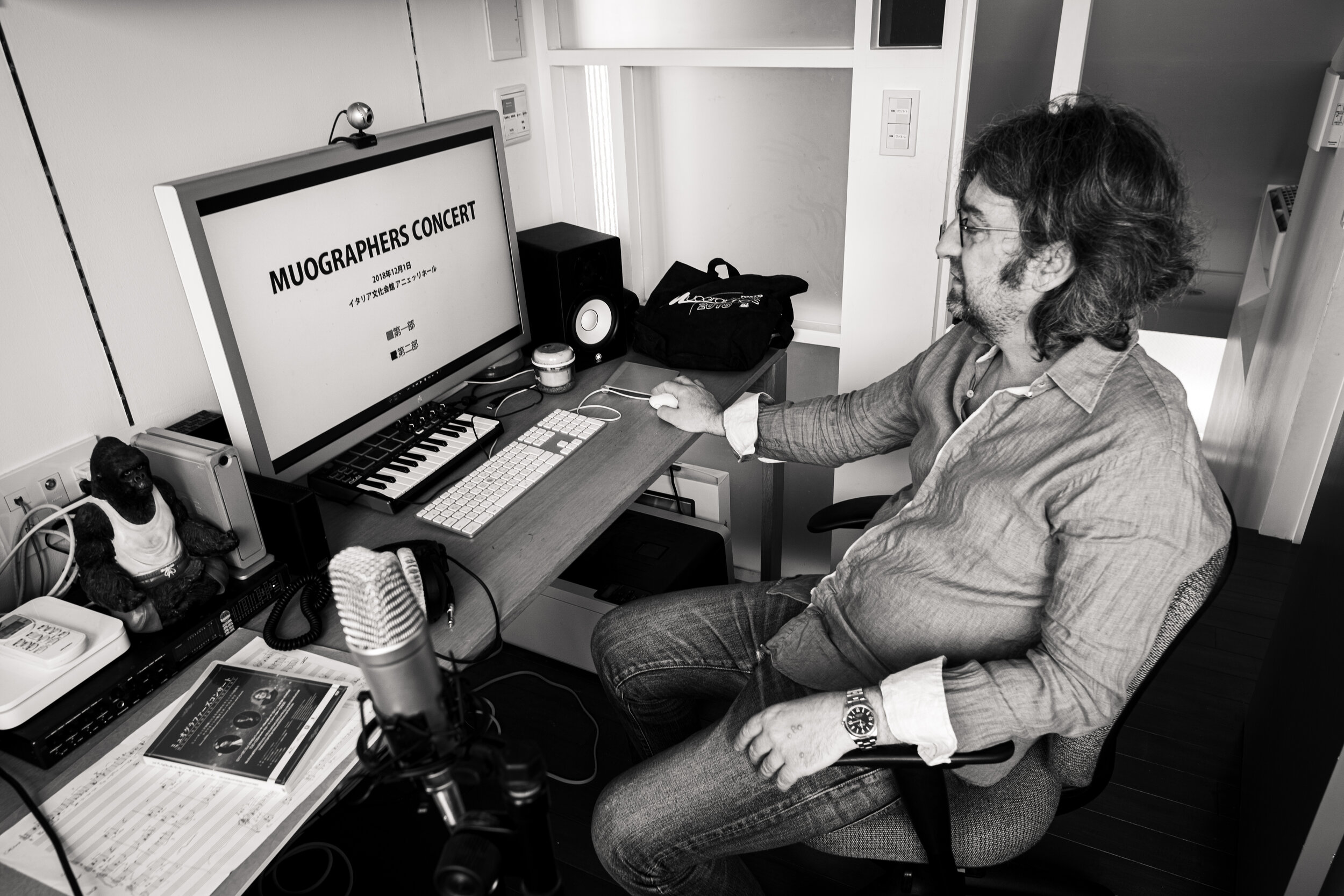Federico Iacobucci, musicista e compositore.
(English Below)
Ero veramente curioso di incontrare Federico, volevo trascorrere un po’ di tempo con lui dopo che l’avevo conosciuto da amici comuni. Subito dopo le prime quattro chiacchere di circostanza mi dice che e’ un musicista e di professione fa il compositore e la cosa mi incuriosisce molto, non ne avevo mai conosciuto uno. Cosi’ un giorno lo chiamo per scoprire come nasce una sinfonia e cosa stimola la creativita’ di chi riesce a tradurre in melodie un’immagine, un sentimento e pure un fenomeno fisico, la muografia come vedremo dopo.
Federico Iacobucci, classe 1975, di professione musicista e compositore, sposato con Sayaka dalla quale ha avuto quattro bellissimi figli, e’ originario di Roma e si trasferisce in Giappone nel 2009 e oggi ci racconta qual e’ il percorso interiore di un compositore, di come sia necessario spogliarsi dei propri preconcetti per descrivere in note un’emozione o un concetto. Un percoso talvolta faticoso ma che ti riserva sempre delle novita’ inaspettate. Il compositore e’ un esploratore, non sa a cosa andra’ incontro, corre dei rischi quando inizia una nuova opera, ma ne esce arricchito al termine del viaggio.
Federico, com’e’ iniziato il tuo rapporto con la musica?
A casa avevamo una chitarra classica che mi ha sempre attirato, avevo circa dieci anni ed incominciai a suonare imparando da autodidatta. Mi piaceva molto, mi divertivo ed imparari da solo tutti gli accordi. Poi a dodici anni sempre da autodidatta imparai a suonare il piano, ero portato e suonare mi veniva spontaneo. Come spesso accade, mio padre pensava che fosse una cosa passeggera o comunque non una cosa importante che mi potesse dar da vivere e inizialmente non mi appoggio’ molto. Ricordo una volta che mi misi a piangere, perche’ non mi spiegavo come potesse non capire che per me suonare era vitale, poi pero’ mi ha sempre sostenuto.
Poi cos’e’ successo?
Ho insistito e anche se le risorse non erano molte riuscii ad ottenere di andare a lezioni private da un maestro di jazz, mi piaceva molto anche il blues e il rock anni ’70 e fondai una Rock Band con alcuni amici. Sono sempre stato un ecclettico.
Quando hai iniziato il conservatorio?
Stavo frequentando il liceo quando capii che dovevo cambiare marcia e così misi da parte il sogno della composizione per concentrarmi sullo studio del pianoforte con una professoressa del conservatorio Casella dell’Aquila. Furono anni di studio matto e disperato. La prima volta che feci l’esame per entrare al conservatorio Santa Cecilia a composizione sperimentale ancora non studiavo pianoforte classico. Successivamente la mia insegnante di pianoforte mi sconsigliò di fare l’esame di armonia a Roma, diceva che mi avrebbero bocciato perché privatista, e invece andò benissimo! Quindi entrai a composizione tradizionale sotto spinta del mio maestro di armonia che poi è stato il mio maestro di composizione a Santa Cecilia, Francesco Carotenuto
Perche’ la composizione?
Gia’ ai tempi delle medie sentivo l’esigenza di esprimermi, molto con la musica ma anche con le poesie che tutt’ora scrivo, mi piacciono i sonetti romaneschi, scrivevo gia’ da piccolo e con gli amici ci divertivamo a mettere su carta le impressioni della giornata. Forse questa e’ una cosa che ho imparato in famiglia, papa’ e’ stato maestro elementare e anche lui si dilettava con la poesia, forse questa e’ una prerogativa di noi romani, siamo creativi, talvolta sbruffoni, ci piace stupire, trovare sempre la parola giusta ma in qualche modo inaspettata. In questo contesto si e’ sviluppato il mio aspetto creativo, mi piacciono le cose pratiche, montare smontare, ho sempre avuto un bel il rapporto con la creativita’ e ho sempre avuto una buona manualita’. Per essere creativo forse serve questo mix di talenti, noi in fondo siamo artigiani, creiamo con quello che abbiamo a disposizione.
Perche’ sei venuto in Giappone?
Durante gli anni del conservatorio ho conosciuto Sayaka, che poi diventera’ mia moglie. Lei suona il piano e parla perfettamente l’italiano. In Italia essere musicista e’ considerato un hobby, e’ difficile crearsi una professione quindi con mio suocero decidemmo di aprire un locale a Omiya-Saitama, vicino a Tokyo dove proponevamo anche musica, questo mi permise di crearmi un network importante di musicisti che ancora adesso mi tengo stretto. Qualche anno dopo pero’ decisi di dedicarmi alla musica a tempo pieno e ripartii con il jazz, essere straniero nel jazz e’ un valore aggiunto e ai giapponesi piace il metodo europeo.
Quanto ritieni sia importante il talento e quanto il lavoro che uno fa per sviluppare questo talento?
Sicuramente il talento e’ importante, e’ il punto di partenza, tutto inizia con un impulso a fare qualcosa, un’attrazione, per me e’ stato cosi’ con la chitarra all’inizio, ma e’ lavorando che scopri la tua vera vocazione, infatti il pianoforte l’ho scoperto lavorando. Il lavoro, l’applicazione, lo studio e la dedizione per quello che fai sono fondamentali per crescere, il talento da solo non basta, ti devi riscoprire incapace e ti devi affidare ad un metodo nuovo ogni volta. Arrivi poi ad un punto della tua crescita professionale che devi fare un lavoro di rimozione, soprattutto se vuoi fare un lavoro creativo, perche’ quando studi tanto, lavori tanto, ti applichi molto su un metodo e costruisci un percorso molto solido che ti da’ una manualita’, diventi in un certo senso un artigiano, che e’ una cosa bellissima, ma se ti poni come creativo, ti devi mettere in gioco, ti devi rimettere in discussione e devi riuscire a toglierti un fardello, mettere da parte questo zaino di conoscenze per aprirti a nuove forme. Sembra un concetto un po’ vago, ma per comporre devi ricrearti uno stile ogni volta, devi capire cosa vuoi rappresentare, entrare in quella cosa, in un concetto, devi spogliarti di tutto e guardare solo quello che hai davanti.
Cosa provi all’inizio di un lavoro nuovo?
Il rischio piu’ grande e’ applicare un concetto esistente a qualcosa di nuovo. Per comporre una musica su un concetto nuovo devo prima interiorizzare questo concetto, lo devo capire, ci vuole molta curiosita’ ed empatia, spesso mi chiedo se saro’ capace di farlo, ti senti spesso impotente e assalito da una sensazione di rischio, come se avessi dimenticato tutto, fa paura. Questo atteggiamento e’ anche il mio sguardo sulla vita, ripartire sempre, e’ un lavoro talvolta faticoso.
Come descriveresti quindi la creativita’?
E’ come San Francesco che si spoglia di tutti i vestiti per andare incontro ad un nuovo modo di vedere la vita, puro, essenziale per guardare all’essenza di quello che hai di fronte. Sei nudo quando inizi un lavoro nuovo e passi attraverso mille tempeste interiori, ma ogni volta ritrovi stimoli nuovi e inaspettati.
Una tua opera recente e’ stata e’ stata la Muography Symphony, un progetto nato con il Prof.Tanaka, fisico dell’Universita’ di Tokyo. Ci spieghi come e’ nata la cosa?
Come tutte le cose belle, il progetto di una sinfonia sulla muografia nasce da un incontro all’apparenza casuale con il Prof. Tanaka, ordinario dell’Univerita’ di Tokyo che non mi stupirebbe se vincesse un premio Nobel un giorno. Ci siamo conosciuti ad un ricevimento all’Ambasciata Italiana, eravamo in coda e lui era davanti a me, abbiamo incominciato a parlare per ingannare il tempo e lui mi racconta della sua vita, di quello che studia e delle ricerche che sta conducendo e ne rimango subito affascinato. Il professore oltre ad essere uno dei fisici piu’ acuti al mondo e’ anche un grande appassionato di musica e nasce tra noi un rapporto di profondo dialogo.
Scusa Federico, ma cos’e’ la muografia?
Detta in parole povere la muografia e’ la scienza che studia il muone, una particella semplice con una massa infinitesimale e carica elettricamente. Il muone e’ generato dai raggi cosmici durante il loro impatto con l’atmosfera e viaggia quasi alla velocita’ della luce. Nonostante abbia una vita brevissima, per via della sua altissima velocita’, riesce ad attraversare grosse masse e questo permette di fare una sorta di radiografia di grandi oggetti, come piramidi o vulcani. Ecco, il Prof.Tanaka ha progettato l’apparecchio che registra la vita di questo muone tracciando l’immagine di cio’ che esso attraversa, permettendo di vedere se all’interno di una piramide ci sono delle stanze vuote, o se il magma del vulcano si sta muovendo.
Cosa puo’ nascere quando uno scienziato incontra un compositore?
Entrambi siamo due curiosi perche’ la curiosita’ e’ la base della ricerca scientifica ma anche della creativita’. Sono sempre stato attratto dalla scienza e il Prof.Tanaka e’ anche un gran conoscitore della musica classica, cosi’ ci siamo detti che poteva essere interessante creare una sinfonia sul percorso di questo muone. In un certo senso ho dovuto studiare fisica, capire bene la materia, immaginarla come lui me l’ha spiegata, me l’ha disegnata come se la immaginava lui, tante domande, molte risposte e ancora domande.
E poi?
Qui inizia quella parte che incute un po’ di timore, quando devi toglierti il fardello dei tuoi schemi e devi immaginarti solo il muone, che nasce, che viaggia, che muore, che si schianta e lascia una traccia. All’inizio e’ solo nella mia testa, non scrivo niente perche’ rischio di alterare la realta’ con un mio preconcetto. Lo lascio nella mia testa, poi torno agli appunti, li ristudio, rileggo e riparlo col professore, poi guardo i macchinari e torno nuovamente alla musica che ancora e’ solo nella mia testa ma che inizia a descrivere quello che sento e che immagino. Quando il pensiero si e’ pulito dai preconcetti, quando ho terminato il percorso di rimozione, incomincio a scrivere l’aria e quando mi metto a scrivere il lavoro praticamente e’ finito, perche’ quello vero e’ cio’ che avviene nella mia testa nei mesi prima, quando non scrivo niente ma ritorno e ripasso solo i miei pensieri. Credimi, e’ un’esperienza che talvolta spaventa anche me.
Che esperienza fantastica! Dove vi siete esibiti?
Abbiamo tenuto concerti sia a Tokyo che a Osaka, tutti hanno suscitato l’interesse di una platea nuova, e’ stato molto bello.
Sono tanti anni che vivi in Giappone e parli bene il giapponese, ti manca l’Italia?
Si molto, mi manca Roma, mi manca l’ironia romana, l’arte di improvvisare e di stupire dei romani.
Qual e’ la tua citta’ preferita in Giappone?
Adoro Karuizawa, un paesino tra le montagne di Nagano, era il posto dove molti intellettuali giapponesi avevano la casa di vacanza (bessō in giapponese) per stare vicini alla comunità di europei che vi si era insediata nella prima metà del novecento, molto carino.
La cosa di cui non sai fare a meno?
Le patatine, lo so che fanno male, ma non mi pento mai di mangiarle e ne sono dipendente.
(English Version)
I was really curious to meet Federico, I wanted to spend some time with him after I met him at a friend’s party. Immediately after the first talk he tells me that he is a musician and a composer and it intrigues me a lot, I had never met one before, so one day I called him to find out how a symphony is born and what stimulates the creativity of those who manage to translate an image, a feeling and even a physical phenomenon into melodies, like the muography as we will see later.
Federico Iacobucci, born in 1975, a musician and composer by profession, married to Sayaka from whom he had four beautiful children, he is originally from Rome and moved to Japan in 2009 and today he tells us what is the inner journey of a composer, of how it is necessary to strip oneself of your preconceptions to describe in notes an emotion or a concept, a path sometimes tiring but which always reserves you unexpected news. The composer is an explorer, he does not know what he will encounter, he takes risks when he starts a new opera, but comes out enriched at the end of the journey.
Federico, how did your relationship with music begin?
At home we had a classical guitar that has always attracted me, I was about ten years old and I began to play learning as a self-taught. I liked it a lot, I had fun and learned all the chords on my own, then when I was twelve years old, always as a self-taught I learned to play the piano, I could play spontaneously. As often happens, my father thought it was a passing thing or at least not an important thing that could give me a living and initially he did not support much. I remember once I started crying, because I could not understand why he did not understand that playing was vital for me.
Then what happened?
I insisted and although the resources were not many at that time, I managed to go to private lessons with a jazz teacher, I also loved the 70s blues and rock and I founded a Rock Band with some friends. I've always been an eclectic.
When did you start the conservatory?
I was attending high school when I realized that I had to change gears and so I put aside the dream of composition to concentrate on studying the piano with a conservatory professor Casella dell'Aquila. Those were years of mad and desperate studies. The first time I did the exam to enter the Santa Cecilia conservatory with experimental composition, I still did not study classical piano. Thus my piano teacher advised me against taking the harmony exam in Rome, she said they would have rejected me because I was and external candidate, but it went very well! Then I entered traditional composition course under the advice of my teacher of harmony who was then my master of composition in Santa Cecilia, Francesco Carotenuto.
Why the composition?
Already at the time of middle school I felt the need to express myself, a lot with the music but also with the poems that I still write, I like Roman sonnets, I was writing as a child and with friends we had fun putting on paper the impressions of the day. Maybe this is something I learned in the family, my dad was an elementary school teacher and he also enjoyed poetry, maybe this is a prerogative of us Romans, we are creative, sometimes boastful, we like to amaze, always find the right word. In this context, my creative talent has developed, I like practical things, assembling and disassembling, I have always had a good relationship with creativity and I have always had a good craftsmanship. To be creative maybe you need this mix of talents, we are basically artisans, we create with what we have available.
Why did you come to Japan?
During the conservatory years I met Sayaka, who later became my wife. She plays piano and speaks Italian perfectly. In Italy being a musician is considered a hobby, it is difficult to create a profession so with my father-in-law we decided to open a restaurant in Tokyo where we also offered music, this allowed me to create an important network of musicians that I still hold close to. A few years later, however, I decided to devote myself to full-time music and started again with jazz, being a foreigner in jazz is an added value and the Japanese like the European method.
How important do you think talent is and how much work one does to develop this talent?
Surely talent is important, it is the starting point, it all starts with an impulse to do something, an attraction, for me it was like that with the guitar at the beginning, but it is by working that you discover your true vocation, in fact I discovered the piano after working. The work, the studies and the dedication for what you do are fundamental to grow, the talent alone is not enough, you have to rediscover yourself incapable and you have to rely on a new method every time. Then you come to a point in your professional growth that you have to do a removal job, especially if you want to do a creative job, because when you study a lot, you work a lot, you apply a method and build a very solid path, you become in a sense a craftsman who is beautiful thing, but if you put yourself as a creative, you have to put yourself on the line, you have to question and challenge yourself and be open to new forms. It seems a somewhat vague concept, but to compose you have to recreate a style every time, you have to understand what you want to represent, get into that thing, in a concept, you have to strip yourself of everything and look only at what you have in front of you.
How do you feel when starting a new job?
The biggest risk is to apply an existing concept to something new. To compose music for a new project I must first internalize this project, I must understand it, it takes a lot of curiosity and empathy, I often wonder if I will be able to do it, I often feel powerless and assailed by a feeling of risk, as if I forgot everything, it's scary. This attitude is also my outlook on life, always starting again, it is sometimes a tiring journey.
So how would you describe creativity?
It is like Saint Francis who strips himself of all clothes to go towards a new way of seeing life, pure, essential to look at the essence of what you have in front of you. You are naked when you start a new job and go through a thousand internal storms, but every time you find new and unexpected feelings.
One of your recent works was the Muography Symphony, a project born with Professor Tanaka, a physicist of the University of Tokyo. Can you explain how it started?
Like all beautiful things, the project of a symphony on muography, was born from a casual meeting with Prof. Tanaka, lecture at the University of Tokyo. We met at a reception at the Italian Embassy, we were in a queue and he was in front of me, we started talking to cheat time and he tells me about his life, what he studies and the research he is conducting and I was immediately fascinated. In addition to being one of the most acute physicists in the world, the professor is also a great music lover and we started a deep dialogue.
Sorry Federico, but what is muography?
Put it in simple words, muography is the science that studies the muon, a simple particle with an infinitesimal mass and electrically charged, generated by cosmic rays during their impact with the atmosphere and travels almost at the speed of light. Despite having a very short life, due to its very high speed, it manages to cross large masses and this allows you to make a sort of X-ray of large objects, such as pyramids or volcanoes. Prof. Tanaka has designed the device that records the life of this muon and the image of what it passes through, allowing you to see if inside a pyramid there are empty rooms, or if the magma of the volcano is being moving.
What can arise when a scientist meets a composer?
We are both curious because curiosity is the basis of scientific research but also of creativity. I have always been attracted to science and Prof. Tanaka is also a great connoisseur of classical music, so we said to ourselves that it could be interesting to create a symphony about the journey of this muon. In a certain sense I had to study physics, understand the subject well, imagine it as he explained it to me, he designed it as he imagined it, many questions, many answers and more questions.
And then?
Here begins the part that brings a little fear, when you have to take away the burden of your schemes and you have to imagine only the muon, which is born, which travels, which dies, which crashes and leaves a trace. At the beginning it is only in my head, I do not write anything because I risk altering reality with my own preconception. I leave it in my head, then I go back to the notes, study them again, reread and repeat it with the professor, then I look at the machines, the moun detectror and go back to the music that is still only in my head but that begins to describe what I feel and imagine. When the thought has cleared itself of preconceptions, when I have finished the removal process, I begin to write the air and when I start to write the work is practically finished, because the real one is what happens in my head the months before, when I don't write anything on paper but I just go back and review my thoughts. Believe me, it is an experience that sometimes scares me too.
What a fantastic experience! Where did you perform?
We had concerts both in Tokyo and Osaka, everyone aroused the interest of a new audience, and it was very nice.
You have lived in Japan for many years and speak Japanese well, do you miss Italy?
Yes, I miss Rome, I miss Roman culture, the art of improvising and surprising.
What is your favorite city in Japan?
I love Karuizawa, a village in the Nagano mountains, it was the place where the first western intellectuals settled in, very nice.
The thing you can't live without?
Chips, I know they are bad for health, but I never regret eating them and I'm addicted to them.



